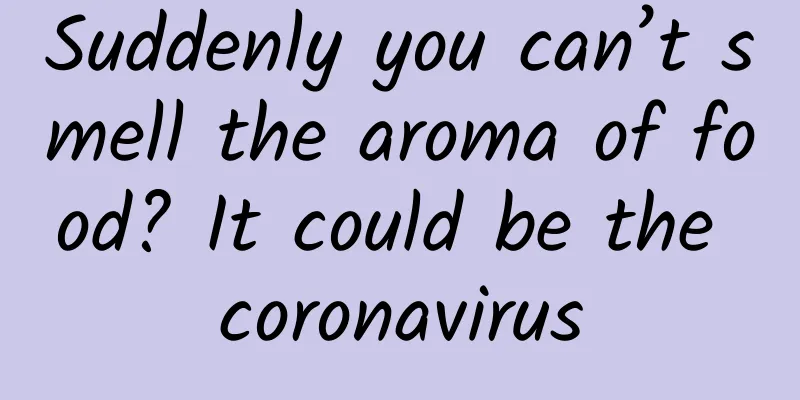Suddenly you can’t smell the aroma of food? It could be the coronavirus

|
Does the loss of smell mean that you are infected with the new coronavirus? How does the new coronavirus cause loss of smell? The mechanism by which the new coronavirus interferes with the sense of smell remains a mystery, and there are many unanswered questions that scientists are waiting to study. Written by | Xu Ying When you are sitting at the table after a hard day and preparing to enjoy a delicious meal; when you step into the kitchen and want to show your skills for your family, you find that you can't smell the food. You don't have symptoms of nasal congestion, but suddenly your sense of smell is lost. In addition, you don't have symptoms of fever or difficulty breathing, but you are found to be infected with the new coronavirus after testing. Is this possible? The answer is yes. Many recent reports and studies have revealed this phenomenon to us - loss of smell is also one of the main symptoms of COVID-19 infection. In the traditional public perception, the clinical symptoms of COVID-19 mainly include fever, cough, fatigue and shortness of breath. However, since March, people have found that neurological symptoms and sudden olfactory and taste disorders may also be auxiliary symptoms of COVID-19 [1, 2]. What is the relationship between olfactory disorders and COVID-19? How does the new coronavirus cause us to lose our sense of smell? Loss of smell - COVID-19 infection warning Loss of smell and taste may be the first symptoms of COVID-19 infection, and in some cases even the only symptoms. In early April, a mathematician in New York found that he had lost his sense of smell and could not even smell the fish fillet when cooking. Later, after being reminded by a friend, he underwent a serological test, which showed that he had been infected with the new coronavirus [3]. A 48-year-old British man tested positive for nucleic acid, but he did not have any other symptoms except olfactory impairment [1]. The correlation between olfactory impairment and COVID-19 infection has been reported in many studies. For example, among 2,000 mild cases of COVID-19 in South Korea, about 30% of them experienced loss of smell, and this was their main symptom [4]. Olfactory and taste disorders may be temporary or persistent. In most cases, the symptoms of smell loss can be quickly recovered, but some patients need a long time to recover. Some people have not even fully recovered yet, and it is unknown whether they can return to normal in the future. Aviva Epstein is a little gourmet who likes to taste all kinds of food. Although she was only a mildly infected patient with the new coronavirus, the new coronavirus destroyed her taste system. After recovery, she could no longer feel the deliciousness of food. She felt nauseous after eating anything and vomited frequently, which had a great impact on her life [5]. Based on this, the American Academy of Otolaryngology proposed adding the symptom of sudden loss of smell and taste to the screening list for COVID-19, and believed that these patients should be considered for self-isolation and nucleic acid testing[6]. Currently, olfactory dysfunction has been listed as one of the main symptoms of COVID-19 infection, guiding doctors to provide olfactory function diagnosis[3]. Olfactory impairment can also be used to predict a patient's condition. Researchers at the University of California, San Diego tested a small group of patients and found that loss of smell may indicate a less severe condition and generally does not require hospitalization [7]. Research from Italy found that young people and women are more susceptible to damage to their sensory organs [5]. However, in these studies, only a small number of people were hospitalized and had their olfactory data collected, so more research is needed to conclude whether olfactory impairment alone can predict the severity of symptoms. Of course, loss of smell does not necessarily mean that you have been infected with the new coronavirus. Although olfactory impairment may be a clinical symptom of new coronavirus infection during the pandemic, it is necessary to test relevant personnel, but this symptom alone cannot diagnose whether he is infected. Because in addition to the new coronavirus, other coronaviruses, influenza viruses, rhinoviruses and parainfluenza viruses can also cause olfactory impairment. Many common diseases, such as simple colds, acute or chronic sinusitis, allergic rhinitis, early Alzheimer's and Parkinson's disease, and aging, can also cause changes in smell or taste. Although the causes are varied, the probability of olfactory dysfunction caused by the new coronavirus is higher than that of other respiratory diseases, accounting for about 30%-98%. However, this high proportion may also be due to the current raging of the new coronavirus around the world - the number of people infected with the new coronavirus is far greater than that of people infected with other viruses, so the proportion of olfactory dysfunction is naturally higher. However, in cities with high infection rates, if someone suddenly loses their sense of smell, medical staff should indeed consider the possibility that he or she has been infected with the new coronavirus[6]. Reasoning: How does the new coronavirus attack the sense of smell? All signs indicate that the new coronavirus attacks not only the human olfactory system, but also the serious damage to the patient's taste and chemical sense functions. On June 20, a study published in Chemical Senses showed that the new coronavirus reduced the patient's sense of smell by about 80%, taste by 69%, and chemical sense by 39%[8]. So how does the cunning new coronavirus attack the human olfactory system? At present, researchers generally believe that the new coronavirus, like the earlier known SARS-CoV (the pathogen of SARS), uses the spike protein (S) on the surface of the virus to recognize and bind to the angiotensin-converting enzyme 2 (ACE2) receptor on the surface of the host cell to enter the cell [9]. In addition, the new coronavirus also requires some proteases (such as TMPRSS2) and other proteins to help the S protein enter the cell (Figure 1). This means that only when a cell expresses all these proteins can it be invaded by the virus and then used to complete the virus's own replication. Figure 1. Replication cycle of the novel coronavirus ACE2 and TMPRSS2 are expressed in many cell types. In the olfactory system, the nose, larynx, and upper bronchial airways express both proteins in high amounts. In the nose, expression of ACE2 and TMPRSS2 proteins can be observed in both respiratory epithelial cells and olfactory epithelial cells, with higher expression levels in olfactory epithelial cells. There are several different types of olfactory epithelial cells, including supporting cells and olfactory stem cells that express these proteins, and low levels in mucus glands and microvilli cells. These cells normally help maintain the health of sensory neurons and the mucus layer - so that odors can properly activate neurons, which provides a convenient door for the new coronavirus to invade. However, olfactory neurons themselves do not express receptors for the new coronavirus, so the new coronavirus may not be able to directly invade these neurons [10]. So how does the new coronavirus affect the sense of smell? There is evidence that the virus can enter the central nervous system through the nose and olfactory bulb and other pathways without invading olfactory neurons. At the same time, ACE2 and TMPRSS2 have different expression patterns in different cells, and olfactory disorders develop suddenly but recover relatively quickly. All of this evidence suggests that COVID-19 anosmia is not caused by damage to the central nervous system, but by the loss of olfactory information before it reaches the brain [11]. If symptoms such as hyposmia and loss of smell are driven by the central nervous system, there will be a slower recovery process and a more complex set of symptoms, including parosmia or phantom olfaction (distorted smells or olfactory hallucinations), but no patients have been found to have these symptoms. One published case report showed that inflammation of the olfactory epithelium may limit airflow into the relatively small olfactory cleft located in the upper part of the nose without causing nasal congestion or respiratory interruption. Damage to the supporting cells in the olfactory epithelium can also affect the function of olfactory neurons in a variety of ways (metabolic, structural, and inflammatory), so that even if odors can reach the neurons, they cannot transmit signals [12]. In addition, the rapid recovery of olfactory function in most patients also indicates that the new coronavirus does not affect the olfactory system by killing olfactory neurons - because, although these neurons regenerate throughout life, their regeneration also requires a process, such as 30 days or longer, and they cannot suddenly regenerate in a short period of time. Of course, there are some exceptions: some people who have lost their sense of smell due to viral infection have not yet recovered their sense of smell, which may be due to widespread death of sensory neurons or damage to the central nervous system. Since symptoms of olfactory impairment may appear early in the disease, before respiratory symptoms, this may help us understand how the virus enters the olfactory epithelium, which is particularly important for studying the infection process. Conclusion The mechanism by which the novel coronavirus invades the sense of smell is still a mystery. There are many unresolved issues that are waiting to be studied by scientists. There are also many articles on preprint websites that have not passed peer review and are waiting to be published. Some of the references cited in this article also come from this, so some conclusions still need to be viewed with caution. The epidemic has hit all countries, but it has also brought unprecedented international cooperation and greater data sharing. I hope that we can unite as one and overcome the difficulties as soon as possible. References [1] Robert Pellegrino, Keiland W Cooper, Antonella Di Pizio, Paule V Joseph, Surabhi Bhutani, Valentina Parma, Coronaviruses and the Chemical Senses: Past, Present, and Future, Chemical Senses, bjaa031, https://doi.org/10.1093/chemse/bjaa031 [2] Why COVID-19 is both startlingly unique and painfully familiar, from https://www.sciencenews.org/article/coronavirus-pandemic-six-months-covid-19-symptoms [3] Why COVID-19 Makes People Lose Their Sense of Smell, from https://www.scientificamerican.com/article/why-covid-19-makes-people-lose-their-sense-of-smell1/ [4] https://www.nytimes.com/2020/03/22/health/coronavirus-symptoms-smell-taste.html [5] COVID-19 Leaves a Bad Taste, Literally, For Some Children Who Recovered From Virus, from https://www.msn.com/en-us/health/medical/covid-19-leaves-a-bad-taste-literally-for-some-children-who-recovered-from-virus/ar-BB15Dj5E [6] Coronavirus, COVID-19 symptoms may include loss of smell or taste, from https://www.today.com/health/coronavirus-covid-19-symptoms-may-include-loss-smell-or-taste-t176597 [7] Yan, Carol H., Faraji, Farhoud, Prajapati, Divya P., Ostrander, Benjamin T., DeConde, Adam S., Self-reported olfactory loss associates with outpatient clinical course in COVID-19. International Forum of Allergy & Rhinology, https://doi.org/10.1002/alr.22592 [8] https://academic.oup.com/chemse/article/doi/10.1093/chemse/bjaa041/5860460 [9] https://www.cell.com/cell/pdf/S0092-8674(20)30229-4.pdf [10] https://www.biorxiv.org/content/10.1101/2020.05.15.097352v2 [11] Abdul Mannan Baig, Areeba Khaleeq, Usman Ali, and Hira Syeda, ACS Chemical Neuroscience 2020 11 (7), 995-998, DOI: 10.1021/acschemneuro.0c00122 [12] Eliezer M, Hautefort C, Hamel A, et al. Sudden and Complete Olfactory Loss Function as a Possible Symptom of COVID-19. JAMA Otolaryngol Head Neck Surg. Published online April 08, 2020. doi:10.1001/jamaoto.2020.0832 |
<<: Why does my body suddenly shake when I sleep at night?
>>: Will the virus that “survives the fittest” eventually become the king?
Recommend
Can you eat yam when you are pregnant?
In fact, you can eat yam after pregnancy. This ki...
Female right lower breast pain
When there is a problem with the body, it will gi...
Bed rest HCG doubles faster
If hcg dosing is not good during pregnancy, it ma...
Exercise: What is the expert consensus?
One of the most unforgettable details of the Spri...
Is postpartum hemorrhage serious?
I believe many of my friends understand that wome...
How big is the follicle? Polycystic ovary
Polycystic ovaries are a common condition in wome...
What does breast category 4a mean?
Many people go to the hospital for a breast ultra...
Brown discharge in underwear during pregnancy
If a pregnant woman has brown discharge in her un...
How to prevent uterine adhesions again
Intrauterine adhesion is a common gynecological d...
Woman wakes up with pain in the middle of chest
Many women often feel pain in the middle of the c...
Why do women have neck wrinkles?
Most people think that wrinkles only appear on ou...
This article will help you understand the correct way to treat diabetes by “control your mouth and move your legs”!
Author: Lin Lin, deputy chief nurse, Beijing Chao...
Is it normal to have dysmenorrhea every month?
Having dysmenorrhea every month is not normal. In...
A brief analysis of abnormal leucorrhea in early pregnancy
When it comes to the problem of leucorrhea, it sh...
Menstrual eye pain
It is normal for women to have menstruation, but ...









